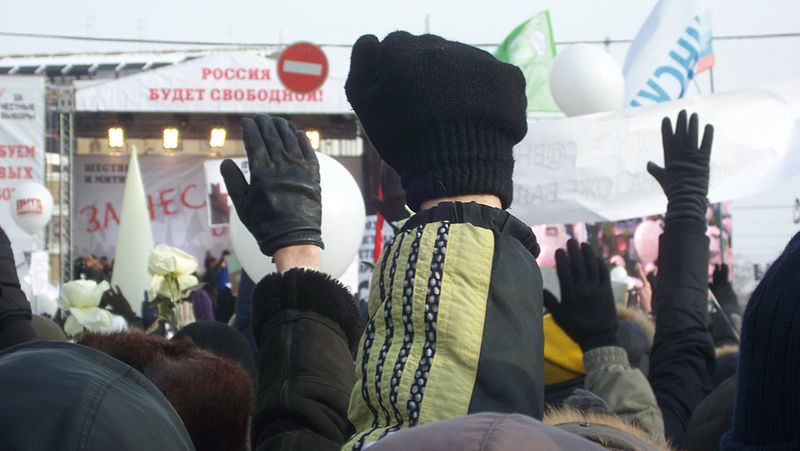Don't Rock the Boat
 On Sunday, Russians from St. Petersburg to Vladivostok will vote to decide who will be president for the next six years. If the favored Prime Minister Vladimir Putin, running in place of incumbent president and United Russia party mate Dmitri Medvedev, wins more than 50 percent of the country’s vote on Sunday, he will become president again and be able to extend his tenure at the apex of Russian political power until 2018. At that point in time, Putin, who will still be a relatively young 65, will have been either prime minister or president for nineteen straight years.
In response to Putin’s decision to return to the presidency and the fraud of the December Duma elections, a large protest movement, based mostly in Moscow, has sprung up in the urban middle class. Whether this protest movement has any bearing on Sunday’s elections is yet to be seen. While the protest movement is certainly indicative of a slide in Putin’s approval ratings, it may not be the cause of the further drop in approval ratings that would be necessary to push Putin below the 50 percent threshold. However, this protest movement is great evidence of a possibly emerging force in Russia: participation in a dynamic political culture.
On Sunday, Russians from St. Petersburg to Vladivostok will vote to decide who will be president for the next six years. If the favored Prime Minister Vladimir Putin, running in place of incumbent president and United Russia party mate Dmitri Medvedev, wins more than 50 percent of the country’s vote on Sunday, he will become president again and be able to extend his tenure at the apex of Russian political power until 2018. At that point in time, Putin, who will still be a relatively young 65, will have been either prime minister or president for nineteen straight years.
In response to Putin’s decision to return to the presidency and the fraud of the December Duma elections, a large protest movement, based mostly in Moscow, has sprung up in the urban middle class. Whether this protest movement has any bearing on Sunday’s elections is yet to be seen. While the protest movement is certainly indicative of a slide in Putin’s approval ratings, it may not be the cause of the further drop in approval ratings that would be necessary to push Putin below the 50 percent threshold. However, this protest movement is great evidence of a possibly emerging force in Russia: participation in a dynamic political culture.
The stereotype, perhaps previously warranted, about Russians is that they are apathetic toward politics, especially the participation of the average citizen in political life, and that they have repeatedly chosen to acquiesce to centralized autocratic rulers who will establish firm, stable governments that provide for – and, in some cases, oppress – the people. Putin, though by no means the most autocratic of Russian rulers, fits firmly into the mold of the strong central leader. He has consolidated power around himself and led Russia out of the dismal economic situation of the 1990s with large GDP growth in the 2000s, as well as growth after the 2008 world recession, including the world’s third highest GDP growth in 2011.
All polls point to Putin winning the upcoming elections with around 60 percent of the vote. This makes sense, given that, despite the perception and actuality of corruption in the Russian government, he has performed to the material benefit of the Russian people. However, the protests hit on something else, a change that has already happened amongst a swatch of the Russian people, the beginning of a culture of political engagement. The December protests touched on the discontent that people had about electing Putin into power to finish off another decade. This protest movement, to my perception, is not focused against the job that Putin has done since the early 2000s. The majority of Russians tolerated a war and lack of press freedom. The protest movement is upset about something much broader, the meaning of 18 years of Putin for the chances of creating a society that most Russian citizens want to live in – a more dynamic democratic society. The expectations have been heightened and the repeat of Putin may or may not be compatible with the transition to a new kind of culture.
However, this original political engagement of the opposition also mobilized the pro-Putin forces, of which there are many. This is not so much a squashing of the desire for a certain political culture as it is the reassertion of another aspect of the desired Russian political culture, the desire for stability and growth. The two forces at play – the desire for a more participatory democratic society and the desire for stability – have not really been weighed against each other in recent times; the latter always seems to silence the former.
The protest and anti-corruption movements have refreshed the political discourse. Even though Putin may win handily in the upcoming elections, this does not mean that this discourse has not taken place, but rather, that the discourse was decided once again in favor of Putin because of his centralized stability (in addition to the lack of good alternative options).
There will be accusations of fraud (even though it will be far less than in the Duma elections) and there will be counter-accusations that the supposed incidences of fraud are just being drummed up by foreigners and the opposition. However, these accusations will hopefully transform into legitimate discussions of what Russian society should look like, rather than discussion of corruption just around elections. The Moscow street opposition will hopefully transform into a more legitimized version of what they are now, the beginnings of a real conversation about the corruption in and hope for Russian political society, real political discourse in Russia. The real question, and what the protesters and Putin loyalists most likely disagree on, is whether this political discourse is possible when Putin leads the country.
